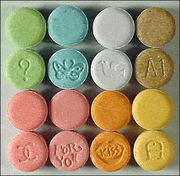 A five year study conducted with thousands of local teenagers by University of Montreal researchers reveals that those who used speed (meth/ampthetamine) or ecstasy (MDMA) at fifteen or sixteen years of age were significantly more likely to suffer elevated depressive symptoms the following year. “Our findings are consistent with other human and animal studies that suggest long-term negative influences of synthetic drug use,” said co-author Frédéric N. Brière of the School Environment Research Group at the University of Montreal. “Our results reveal that recreational MDMA and meth/amphetamine use places typically developing secondary school students at greater risk of experiencing depressive symptoms.” Ecstasy and speed-using grade ten students were respectively 1.7 and 1.6 times more likely to be depressed by the time they reached grade eleven. [continue reading…]
A five year study conducted with thousands of local teenagers by University of Montreal researchers reveals that those who used speed (meth/ampthetamine) or ecstasy (MDMA) at fifteen or sixteen years of age were significantly more likely to suffer elevated depressive symptoms the following year. “Our findings are consistent with other human and animal studies that suggest long-term negative influences of synthetic drug use,” said co-author Frédéric N. Brière of the School Environment Research Group at the University of Montreal. “Our results reveal that recreational MDMA and meth/amphetamine use places typically developing secondary school students at greater risk of experiencing depressive symptoms.” Ecstasy and speed-using grade ten students were respectively 1.7 and 1.6 times more likely to be depressed by the time they reached grade eleven. [continue reading…]
Ecstasy

© iStockphoto
Have you ever forgotten to post an important letter or let an appointment slip your mind? A new study from UK researchers suggests that for those who regularly use ecstasy or other recreational drugs, this kind of memory lapse is more common. Their research, which uncovered potential links between memory deficits and cocaine for the first time, Journal of Psychopharmacology, published by SAGE.
[continue reading…]

© iStockphoto
Exposure to ecstasy or cocaine during adolescence increases the “reinforcing effects” that make people vulnerable to developing an addiction. This is the main conclusion of a research team from the University of Valencia (UV), which has shown for the first time how these changes persist into adulthood.
“Although MDMA and cocaine are psychoactive substances frequently used by teenagers, very few studies have been done to analyse the short and long-term consequences of joint exposure to these drugs”, José Miñarro, lead author of the study and coordinator of the Psychobiology of Drug Addiction group at the UV, tells SINC [continue reading…]

MDMA, which has been made criminally illegal worldwide, is taken most commonly in pill form.
Treatment with a pharmacological version of the drug ecstasy makes PSTD patients more receptive to psychotherapy, and contributes to lasting improvement. Norwegian researchers explain why.
People who have survived severe trauma – such as war, torture, disasters, or sexual assault – will often experience after-effects, in a condition called posttraumatic stress disorder (PTSD). The symptoms can include anxiety, uncontrolled emotional reactions, nightmares, intrusive memories, sleep and concentration difficulties, evasion of situations that resemble the trauma, and feelings of shame or amnesia. [continue reading…]
